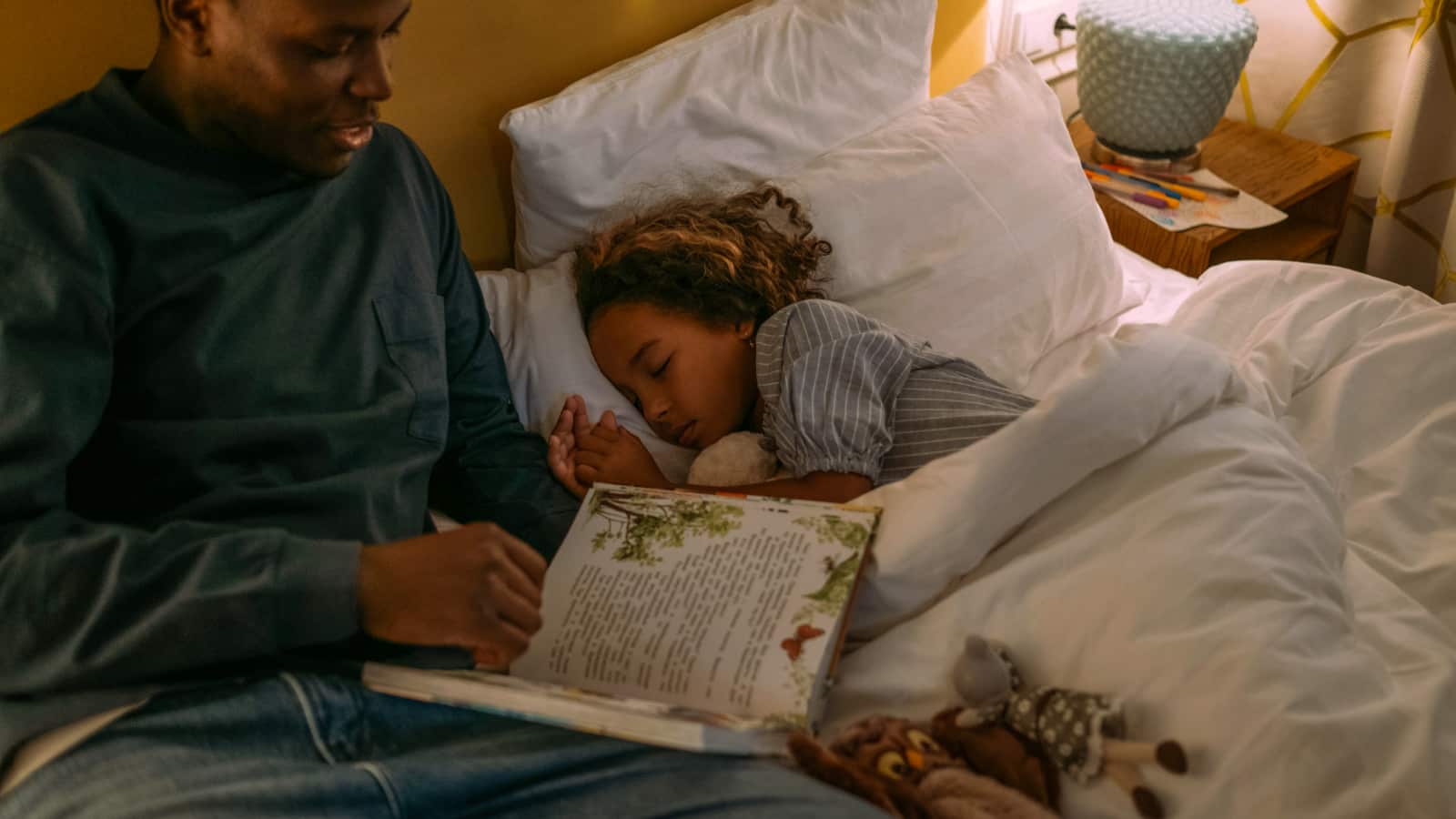It is typical for young children to experience fear as part of their normal development. These fears can be related to various things (monsters, animals, bugs, noises, the dark itself…you name it) and are often unavoidable. So long as they aren’t pervasive, they can be worked through with time, patience, and empathy.
One day your child might be perfectly happy going to sleep in their cozy bedroom, and then suddenly, without having seen a single scary movie, they are terrified of their dark bedroom at night.
Parents may be wondering: What causes this shift? What was the catalyst? Why are they so afraid of the dark suddenly?
- Normal development: Childhood fears are developmental. As children grow in their understanding that the world extends beyond the safety and four walls of their home they are wondering “Am I safe?”
- Life events: Sometimes bedtime fears are triggered by something that isn’t really that scary at all. Monsters aren’t necessarily the thing that causes a child to keep running away from their bedroom at night. It may be a traveling parent, a new school or home, sibling on the way, a visit to the doctor, holiday break, etc. The bottom line here is control. Children realize that unexpected things can happen to them. That feeling of not knowing what to expect, that loss of predictability, this is what is scary. Their boat is being rocked by the unexpected.
- Separation from you: Sometimes it’s as simple as needing more reassurance at bedtime that parents aren’t going away. Separation is a major developmental hurdle for young children and can evoke feelings of fear. Children don’t necessarily know that their parents stick around on the other side of that door after they have said goodnight. That fear might manifest as a fear of the dark.
So, knowing what we know, how can parents help their child when they are struggling with these very normal fears?
Tips to help your child if they are afraid of the dark
1. Validate their feeling but don’t validate their reason
There is an unfortunate misconception that some parents have, which is that when their child says they are scared, that they are manipulating their parents. This is the wrong parental mindset to be in. It will not serve you or your child and it is best if you take that mindset off the table.
You have to believe that they are scared. You have to say it back to them without judgment. You must validate what they are telling you in the most genuine way possible. Let them know that you hear them BUT don’t lend credence to their fear by checking for monsters in the closet. By checking under the bed and in the closet, you are giving the sense that it’s a possibility that something could be there. They get confidence from your tone, not just your words.
The goal is to find a balance between warm and empathic, believing that something feels off for them, and not acting as though there is in fact something to be sacred of. So, again, we don’t want to be dismissive. We want to reiterate what they are saying, share that we understand, narrate their fears back to them… but don’t go on a monster hunt.

2. Keep bedtime routines boringly consistent
Same order of operations so they know what to expect. Brush teeth, story, song, kiss, goodnight, out you go. That doesn’t mean, be boring, keep your tone warm and positive.
3. Listen to their play
By doing some detective work (AKA eavesdropping on them while they play independently), you can gain some valuable insights into what is on their mind as of late. A great place to tune into their “self talk” is during their bath time. Give them a bunch of toy figurines, people, animals, families, superheroes, and then sit on the other side of the bathroom and pretend to be on your phone for a bit. You will be amazed at the insightful peek you will gain into what may be on their mind. Obviously this is more for 2.5-6 year olds than it is for 8-10 year olds but you get the idea, a little sleuthing can go a long way on the path to understanding what’s happening for your child.
4. Provide comfort in a sustainable way
Whether or not to let your child sleep with you is a matter of personal preference. Some say “Yes, safety comes from feeling safe, that’s the only way”. Others say, “No way, I’ll never get my kid back in their own bed.”
You know your child and the consistency with which you can get away with occasional shared bed, so that’s your call. One sleep specialist I consulted with some years ago suggested creating a floor bed in your room so that they can come in and be near you if they need to while maintaining your own ability to sleep. It’s not all that comfortable for them but does provide the ability to be near to you, in a moment of desperation it’s there. Again, know your kid. This may or may not be the thing.
The main goal is to provide comfort and safety in a sustainable way for both you and your child.
5. Don’t try to convince them out of their fear
It will only make it worse. Trying to convince your child that there is nothing to be afraid of often results in them growing the scope of their fear. The back and forth just feeds the beast. Because ultimately what kids want, what we all want, is to be heard and understood. So do that instead and get to the root of the issue more easily.

6. Put some control in their hands
As we discussed in the beginning, not being in control is a huge part of the fear of the dark. So, give them some things to be in control of! Up the ante on choices: Do you want to wear footsie pajamas or two piece pajamas? Do you want to have pizza for dinner or soup and toast? Do you want a bubble bath or a shower? More choices, more power, more control, hopefully, maybe a bit less fear.
7. Co-regulate by coming back before they are asleep
I know, it's counter intuitive, they are finally quiet and in their room, you might be thinking, why would I go in? Isn’t that stirring the pot? Nope. Do it and do it again, multiple times the first week, and then the next week do only one check in each night, and then do them as needed/requested.
Annoy them with your check ins for a bit. When a parent checks in on a child at night and provides reassurance, it will help lower the child’s cortisol levels, which are stress hormones. The presence of a responsive adult, you, helps regulate the child’s stress response and makes them feel more safe and secure.
The bottom line is: Kids can’t help that they are having this experience. As Dr. Ross Greene says, “Kids do well if they can.” It’s natural to have these developmental hurdles. Fears are natural and normal. It’s OK. It’s not necessarily a reflection on you or your parenting. Try to stay patient and try these tips. As the saying goes, “This too shall pass.” Good luck!

















